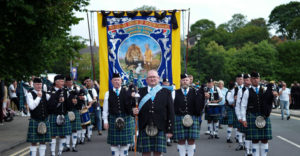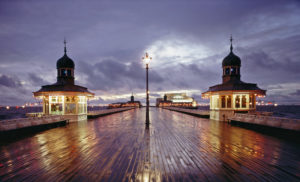West Lancashire has always been defined by its relationship with other places. The rural constituency, which elects a new MP this week, covers the geographical area west of Wigan, north of St Helens, east of Southport, north-east of Liverpool and south of Preston. That’s five large urban conurbations, each with its own problems, which are quite different from those of West Lancashire, but which nevertheless exert a strong pull.
West Lancashire’s largest town, meanwhile, has a population of just under 40,000. Skelmersdale — or “Skem” — was one of the very first New Towns, built in the Sixties to accommodate families from some of Liverpool’s worst slum housing. They were plonked down in the middle of a rural, mostly Tory-voting wilderness; the railway line to the city had closed to passengers in 1956, so these new arrivals were completely cut off from relatives and friends. This isolation was probably the main reason why “Skem” never flourished. But it nevertheless changed the fate of the surrounding area.
In West Lancashire the Tory tradition remained strong. But Skem’s growing size meant that the district council of West Lancashire had a strong Labour representation. Meanwhile local Toryism, once a powerful force, has fragmented. When the constituency of West Lancashire was formed in 1983, it elected a Conservative MP, Ken Hind, but it has had a Labour MP since 1992, as the “red” political influence of Liverpool spread well beyond Skelmersdale. Middle-class Liverpudlians have steadily relocated to the old market towns of Ormskirk and Burscough while continuing to commute into the city. Edge Hill University, Ormskirk, has boosted the economy of the area, as well as making the population more cosmopolitan, with a more Liverpool-centred attitude.
All of this begs what we might call the West Lancashire Question. While Tam Dalyell’s West Lothian Question related to dilemmas facing Scotland as part of a devolved UK, the West Lancashire Question might consider the fate of English regions in an increasingly muddled local government jigsaw. The constituency may be about to decide who it wants to send to Westminster, but how does it want to rule itself?
Today’s local government structures completely fail to represent the reality of the area and its hinterland. At the moment, the local authority is West Lancashire Borough Council, which operates as part of Lancashire County Council. And yet the politics and economics of the area are shaped by Liverpool: surely, then, it should be part of the Liverpool City Region?
LCR represents around 1.5 million people, comprising the councils of Liverpool, Sefton, Knowsley, St Helens, Halton and Wirral. It has its own elected mayor, Steve Rotheram, and, with a remit that covers transport, housing and economic development, it has more power than not only West Lancashire Borough but the entirety of Lancashire County Council can dream of.
Although West Lancashire increasingly looks, feels and even sounds like the Liverpool City Region — listen to the accents in Ormskirk pubs and cafes — it is stuck within Tory-led Lancashire County Council, which has very limited resources. The county council does collaborate with Labour in Liverpool City Region and West Lancashire Borough: close work between them yielded what seemed an attractive bid to bring trains back to Skelmersdale with a direct link to Liverpool. But this was turned down by central Government, suggesting that cheaper options should be explored. The bid was backed by Rosie Cooper, who described the decision as a “betrayal”.
If, however, this project had been proposed across the water in Wales, which has devolved powers over transport, the decision would have been different. As it was, Whitehall scuppered a project which would have brought major benefits to a town strongly in need of “levelling-up”. And the Westminster representative could do nothing about it. The region needs its own powers.
There is no simple solution, though the most obvious would be to make the constituency part of Merseyside. But some in West Lancashire, particularly those living to the north of the constituency, would argue that the link to Preston is just as important as the link to Liverpool. The irony of the current “combined authority” arrangements is that they are too restrictive: the old “historic” Lancashire included all of Liverpool, Manchester, Preston and beyond. It was a mighty region, dismantled by Government edict in 1974. The effect has been to weaken and divide what was a powerful province through its own democratic structures.
Part of the problem is one of democratic accountability. For all its faults and limitations, Lancashire County Council is a democratically elected body with county councillors representing local wards. The Liverpool City Region Combined Authority, apart from the mayor, is indirectly-elected. It doesn’t make for good governance and makes the combined authorities difficult to influence. The London model, where the Greater London Authority provides oversight for the mayor, would be an improvement: like the devolved governments of Scotland, Wales and Northern Ireland, it is elected through a proportional system.
It’s too late to restore pre-1974 Lancashire. Rather, we should imagine a much-enlarged Lancashire, which can include the combined authorities of Liverpool and Greater Manchester. Perhaps we could even start to seriously consider John Prescott’s idea of a “North-West” regional government with the resources and powers to create the sort of vibrant regional economies that the German Länder have supported. Most other European countries have strong regional governments, which are able to raise their own taxes and make decisions independently of the state. Here in England, even relatively small projects have to get approval from Westminster; all too often, they get rejected. Why not give Lancashire — which has almost as many residents as Northern Ireland — the same democratic government, and powers, that Scotland and Wales have?
Labour should be hammering away on this. Not many miles away, in Oldham, the highly-respected Coliseum Theatre is closing because every penny of its funding from Arts Council England has been cut. Keir Starmer has been silent on this and other local disappointments. Is it because he doesn’t want to be seen to be too “Northern”?
Labour is likely to win this by-election. But it is not doing enough for West Lancashire. If it had any idea what was good for the region, the party would empower it, by supporting the creation of a Greater Lancashire authority. And not make it go to Whitehall with a begging bowl which is all too often thrown back in their face.
Disclaimer
Some of the posts we share are controversial and we do not necessarily agree with them in the whole extend. Sometimes we agree with the content or part of it but we do not agree with the narration or language. Nevertheless we find them somehow interesting, valuable and/or informative or we share them, because we strongly believe in freedom of speech, free press and journalism. We strongly encourage you to have a critical approach to all the content, do your own research and analysis to build your own opinion.
We would be glad to have your feedback.
Source: UnHerd Read the original article here: https://unherd.com/



